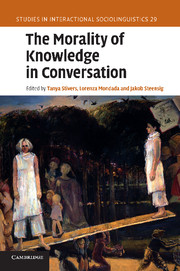Book contents
- Frontmatter
- Contents
- Contributors
- Preface
- Acknowledgements
- List of transcription and glossing symbols
- Part I Introduction
- Part II Affiliational consequences of managing epistemic asymmetries
- 2 The management of knowledge discrepancies and of epistemic changes in institutional interactions
- 3 Claiming epistemic primacy: yo-marked assessments in Japanese
- 4 Morality and question design: “of course” as contesting a presupposition of askability
- 5 Addressing epistemic incongruence in question–answer sequences through the use of epistemic adverbs
- 6 The epistemics of make-believe
- Part III Epistemic resources for managing affi liation and alignment
- Part IV Toward a framework
- References
- Index
5 - Addressing epistemic incongruence in question–answer sequences through the use of epistemic adverbs
Published online by Cambridge University Press: 05 November 2011
- Frontmatter
- Contents
- Contributors
- Preface
- Acknowledgements
- List of transcription and glossing symbols
- Part I Introduction
- Part II Affiliational consequences of managing epistemic asymmetries
- 2 The management of knowledge discrepancies and of epistemic changes in institutional interactions
- 3 Claiming epistemic primacy: yo-marked assessments in Japanese
- 4 Morality and question design: “of course” as contesting a presupposition of askability
- 5 Addressing epistemic incongruence in question–answer sequences through the use of epistemic adverbs
- 6 The epistemics of make-believe
- Part III Epistemic resources for managing affi liation and alignment
- Part IV Toward a framework
- References
- Index
Summary
Introduction
Scholars working within quite divergent research traditions have argued that conversation requires speakers and recipients to assume that some things are held in common. These assumptions can range from the idea of a shared language and culture to details derived from joint experiences including prior conversation (Clark 1996; Grice 1975; Stalnaker 1978). In the conversation-analytic and ethnomethodological traditions, common ground, or intersubjectivity, figured as a central feature of interaction from early on. As demonstrated, for instance, by Garfinkel's ethnomethodological breaching experiments (Garfinkel 1967), failure to apply background knowledge when interacting with others has moral consequences. Reflecting on these experiments, Heritage concluded that “there is no quicker way, it appears, of provoking moral outrage than by not using background knowledge to make sense of other people's actions” (Heritage 1984b: 182).
The centrality of background knowledge to talk-in-interaction is evident in that languages provide resources dedicated to pointing out that information is shared. This chapter focuses on one such resource, namely the adverbs jo (Danish) and ju (Swedish). We begin with the observation that jo/ju, when used in an answer slot, claims that the questioner failed to take into account shared knowledge, which should have informed the design of the question. The inclusion of jo/ju in a slot where an answer is due thus embodies a claim of “epistemic incongruence,” in that the basic epistemic configuration of a question (Hayano this volume) – that the answerer knows something the questioner does not know – is challenged.
Information
- Type
- Chapter
- Information
- The Morality of Knowledge in Conversation , pp. 107 - 130Publisher: Cambridge University PressPrint publication year: 2011
Accessibility standard: Unknown
Why this information is here
This section outlines the accessibility features of this content - including support for screen readers, full keyboard navigation and high-contrast display options. This may not be relevant for you.Accessibility Information
- 80
- Cited by
